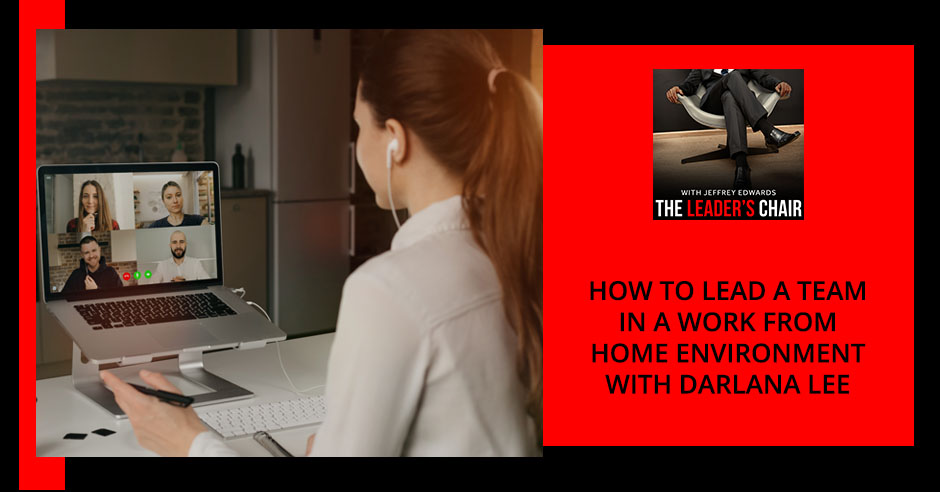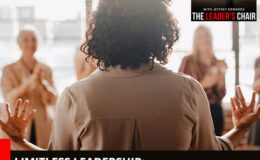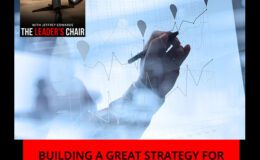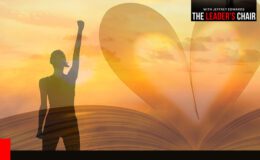
With the pandemic, working from home has become the norm for most people. But Darlana Lee is not most people, she has been working from home 15 years before it was cool. Darlana is the Leader of the Global Facilitator Team at Hewlett Packard Enterprise and is responsible for guiding her team in delivery and business solutions around the topics of leadership, professional skills, and onboarding. She manages multiple teams across the globe in an online work-from-home setup. Join your host, Jeffrey Edwards as he talks with Darlana about the pros and cons of working from home and the adjustments she had to make when taking on a leadership position.
—
Listen to the podcast here:
How To Lead A Team In A Work From Home Environment With Darlana Lee
When we talked about the world of working from home, remote working and hybrid teams, getting a perspective from someone who has lived that experience is important to understand some of the nuances that come to play when you’re coming from an individual performance perspective. Also, looking at it now from a management perspective. I had the opportunity to work with our guest. It feels like it’s going back for years to see where she has taken her career. Not only has taken it but owned it. She is in a role supporting others, developing leaders, and her staff around the world. Helping them be better at what they do is a treat to be sharing this time with her. Our guest is Darlana Lee. She is the Global Delivery Leader for Professional and Leadership Programs at Hewlett Packard Enterprise. She heads up the team of facilitators, who in the areas of leadership inclusion and onboarding for the organization. Darlana, welcome to the show.
Jeffrey, thank you for inviting me to this show with you. I’m excited to be back with you with our history but also to join you in this session.
Darlana, when you look back to when you first started in this industry, we look at high-tech in general, the sector, it’s been one of the sectors where it’s more of the pioneering where people work from home, work remotely or in the office. For you yourself being based in Regina, what was the experience like for you when you started your professional career and realizing that it wasn’t going to be going into the office?
Leadership is to be willing to roll up your sleeves, dive in, and be uncomfortable. Click To TweetWhat’s interesting, Jeffrey, to that point is I started working at home or remotely years ago. I’m working with a global team, getting the opportunity to try to find that balance of work and life, being at home versus in an office but also in a very fairly remote location in Regina, Canada. It’s not a large center by any means. I’ve had many years of experience in remote work. What’s very interesting is to see a lot of my colleagues and peers go through it in 2020. Understanding some of the challenges, the benefits as well, being able to work remotely and how successful it can be. That’s been a real eye-opener as well for many people in 2020.
When you start working from home or working remotely, oftentimes you’re part of a team of people that are all working towards the same thing. What was it that you found that was important for you as an individual performer to stay engaged and to feel connected to that team?
That engagement is a little bit more challenging when you’re remote. When you’re in the office, it’s natural walking by each other in the hallways, saying hello in the elevators, those kinds of things. It happens naturally. Whereas remotely, you have to be a little bit more deliberate. Put a little bit more effort into building those relationships and having those conversations. One of the things that a lot of people find is that it’s very easy to jump into the business at hand. There’s a lot of research that has been done. How important and impactful the relationships are to working, especially working virtually. Being more deliberate in how I have built those relationships, both as an individual but also as a leader. How do I make sure that I’m bringing in those components? Building that team relationship is critical to building trust, which then drives high performance and success in the end.
What did you enjoy the most working remotely?
It’s the high level of accountability, trust and then flexibility. It was the trust from you and that I’m capable of doing what I do best but from home. That does require leadership trusting the employees to be able to accomplish things in a less structured environment. The flexibility has always been nice. More gets done but I get a little bit more of that flexibility when that meets my life as well. It’s being able to try to find that work-life balance.
If there was one challenge that you had, what would you say that was? You knew there were people in the office and here you are. You’re getting on calls. You’re traveling as well. Do you still have to connect with everyone else who’s doing the 9:00 to 5:00 in the offices?
The biggest challenge, especially for the first years was being one of the only remote people. Having the majority of the group in an office, they’re 1 or 2 people on the line that were like, “We forgot about you, Darlana. Are you still there? What are your thoughts?” Always having the confidence and the courage to always speak up, share my opinion and my voice, which can be a challenge when you’re virtual and everyone else is having sometimes side conversations. When you’re face-to-face, it’s easy to talk over one another and still get the gist of the conversation. Whereas when you’re remote, it’s harder to jump in. Having my voice heard has been one thing. I wouldn’t want to say I had to fight for it but I always had to make sure that I would always put my hand up to make sure that I could contribute.
In the time that we’ve known each other, you’ve seen the evolution not only of the work environment but also technology that comes along with it. When we were working together, the video conference was an exception. There are a lot more phone calls and Polycoms that we dealt with. Now that you’re sitting in a global leadership role here, what are some of the lessons that you’ve learned over your career that you’re putting and implementing within your own team?
Technology is both a blessing and a curse. I’m sure we can all probably agree to that. When it works, it’s brilliant in bringing in engagement, involvement and a variety of different methods. With a global workforce, that’s what you need because not everyone communicates the same, learns the same, contributes the same. Being able to leverage some of the different technologies and the capabilities that those technologies can bring elevates the conversation and the teamwork that comes with that. Where it becomes a curse when it doesn’t work, the scrambling and trying to figure out how do we make this work. I know with many of us in 2020 moving to work from home bandwidth has become probably one of the bigger challenges.
They are no longer in an office where there’s a stable connection. They’re working from home and multiple people at home pulling on that same bandwidth. That’s been the biggest challenge. It’s trying to find different opportunities and different ways to engage. Also at the same time, being okay with the fact that sometimes technology isn’t going to work and that’s okay. I’ve had my challenges. We have storms that go through, power outages, family, or other people in the home that are pulling on our time and our bandwidth. It’s being human about it and being okay with the fact that sometimes this is going to happen as long as it’s not a regular occurrence. That also drives a level of trust. That is important for remote but also global teams.
When you speak of trust, Darlana, how do you define that for yourself? Now that you’re being and part of management, what does that mean when you tell one of your direct reports that I trust you? What would that mean for them?
Trust is very personal. We all look at trust very differently. There are different aspects that we look at. For me personally, when I tell someone that I trust you, I do have some expectations that the job is going to get done, whether that’s between the hours of 8:00, 9:00 to 5:00, in a 24-hour period or within that week. There is the accountability that things are going to get done in a timely fashion and a standard of quality that is expected of them in that particular role. Knowing that they’re going to get the job done but at the same time, if they have roadblocks, not to be fearful to reach out. Some of the other components of trust is knowing that fear of having to raise their hand if something comes up or they have challenges for whatever the reason. Having expectations but also ensuring that they feel comfortable to come to me if they do have challenges themselves.
Following up on that, managing a global team, you’re cutting across all different cultures. There are different relationships across cultures when it comes to employee management. It’s one thing to share what you share in terms of trust and have that conversation. What are some of the challenges that you find when you’re working across different cultures where it’s maybe understood here in one part of the world but in other parts of the world it may not have the same meaning?
Cultures and language also can play a role in that as well. A lot of it can lead to miscommunications to your point. What it means here can be very different and what it means to you to other cultures in other parts of the world. Part of it is demonstrating, leading by example, continuing the conversations. It isn’t just one and done conversation. We have it once and then we never talk about it again. Continually demonstrating, talking about it, giving them opportunities, safe spaces to ask questions, to share concerns, having a regular cadence of meetings as well is important. Trying to find that right balance of not micromanaging, engaging in too much but also, at the same time, continuing to connect, engage and support in a way that makes sense.
It’s learning about cultures and having that relentless curiosity but in a respectful way. Learning about their cultures and what does this means to you. I’ve had some new team members come on as well. It’s learning the new personalities as well as the cultures. “This meeting is to not talk about work but to talk about us and what we want to do.” It comes back to those relationships. How do we continue to build those relationships? Without the relationships, everything else falls by the wayside, time zones and everything else. They’re still challenges but not quite to the same degree. It’s about building those relationships, demonstrating and leading by example. This is what I’m looking for. I’m willing to do what I say as well. I’m not just telling you what to do but I do it as well.
How many people do you manage? Where in the world would they be located?
My team has undergone some changes over the past years. Many organizations have. We have as many as ten then at five. I’m shrinking in direct full-time staff. I’m working a lot more with a partner vendor as well. There are probably about fifteen people that I work with from that team as well engaged in this. We have forced range and all of the different Americas locations from first myself and in Canada, US, Mexico, Costa Rica. In Europe, I’ve had the UK and the Netherlands. I work a lot with Bulgaria and Spain. We have India and then in our Asian regions, Japan, China, Australia, Singapore, just to name a few.
It’s important to highlight that. There can be that thought that, “I’m working from home. I’m managing a team. Everyone is in their respective region. We get on the phone. We get on Zoom, whatever that may be. We all do the same thing.” With the geography that you point out there, that’s pretty widespread. What’s the best approach with this individual, with this person on my team or partner versus someone else I have to work with within another part of the country or another part of the world?

Work From Home: You need to trust your employees to be able to accomplish things in a less structured environment.
It’s important to recognize the diversity, which also can make scheduling meetings. Zoom meeting is a challenge. The time zones are part of that and trying to find the right time to meet with people. They can be intelligent contributors. I work with a team to find out what are those kinds of hours knowing that we have a global team, knowing that some of our meetings are going to happen after your standard workday. For me, after 9:00 PM, 10:00 PM, my brain shuts off. I can be there in body but if you want me to contribute and participate in the conversation actively, we may want to look at it at different timing.
Part of it is having those broad team meetings. Knowing what some of the commonalities are of the team, what they need and what they’re doing. Talking about collectively the vision, the strategy and the priorities as a collective group but then also using the one-on-one times as well to bring it more to them individually. What does this mean for them individually from a culture perspective, from a role perspective, from a career development perspective as well? Everyone is looking at slightly different aspects in how they want to grow and develop themselves and taking all of those into consideration when you’re having those conversations.
That comes back to this isn’t a one-and-done conversation but having multiple types of conversations with the team, in very times, time zones and things like that. With the team meetings, I alternate. One is early morning for me and late night for some of my Asian teams. I’ll switch it. It’s late-night for me but it’s at least earlier morning for some of them. Not the same person or persons are being put out every single time. Once a month, you have to work late. That also comes back to the trust, the building relationships. I respect you and your time. This isn’t a standard work time zone as well.
What have you learned most about yourself as a leader in the organization?
The biggest thing is that I can do it. There are a lot of differences and challenges that you’re faced with on a daily basis. I’ve got the core competencies and skills to do my best, to make an impact and still be able to bring value to the individuals in a way that is done with respect but also support. That’s part of who I am. I love to support and inspire others. At the same time, have a little fun. Knowing that I can still have fun, engage, inspire but in a different way but also, I can do it. I’ve been challenged a lot with a lot of things that I’ve never done before and yet I keep showing up. Did I do it perfectly? Probably not, although I’d like to think so. I know that I haven’t but that willingness to continue to grow and develop myself and to know that I’m doing my best.
Part of it is giving yourself permission to learn and not feeling that you have to come in all fully prepared and ready for battle.
The other challenge was when I first took over this leadership position. I was up here with all of my direct reports. Moving from that peer to their leader and how the dynamics had changed with it or the different relationships with the team as well. It was a little bit of that learning curve, that permission that it’s going to take a bit of time to get comfortable and used to the new dynamics in play, how the different cultures and peers are going to view me as the leader instead of a coworker.
What was that like? It’s one thing to be the peer. The next thing it’s like, “I’m doing a performance review.” I’m curious. From your experience, what was that like for you?
I have to admit, I had a fantastic group to work with. They made it pretty seamless for me. Knock on wood, the team themselves are very high performing. Initially, I was more of that figurehead but they did embrace me. They supported me through a lot of the challenging conversations that we had to have even leading up to it. When the position became available, a lot of my peers asked me, “Are you going to be the one to do this? We think you would be a great candidate for this position.” Having that support going into it helped me. Having the team that I did, I know a lot of people don’t have that luxury and that there is a little bit of animosity because there are multiple people looking at that same position. I was very fortunate. The team did rally around me and support me. For those that I knew that were interested in the position, I talked about it with them, what happened and also being mindful about that peer/leader coaching. What would they do differently next time? What did they learn from the application process themselves? How might they apply it when they’re applying for future positions?
When you first applied to join the group years ago, did you ever imagine yourself sitting in the chair you were in?
Yes and no. Mostly no. When I had first reached out to you, it was a complete career change because I was in IT doing systems administration, programming and then moving into to HR and facilitation was a complete shift. I thank you for taking a chance on me and being willing to try me out as somebody who was completely untested in this area. I have to admit, it changed my life. Thank you for playing a part in this but it really did. After the first year or two, once I felt comfortable, it was like, “This is what I love to do. I can’t imagine anything else.”
It took me many years to even want to even raise my hand to change into the role that I’m in. This role of learning and development, encouraging people to develop themselves, the career growth and inspiring people has been a big passion of mine. In a leadership position, I get a different approach to it and a higher level impact on these types of programs. It’s part yes, part no. I’ve taken over the world and I still think I can, whether I want to or not. It might be a different story but it’s been a fun ride. I have a lot of you to thank for that.
Team relationships are critical for building trust, which then drives high performance and success. Click To TweetYou’ve shared a lot of the insights from your own experience. One of the things that stood out for me is that you’re willing to put your hand up, your willingness to dive in, take a chance and be uncomfortable. When you look at people within your team, even within your peers in your management group itself, what are some of the lessons that you’re also picking up? Being a part of management, you’re part of two teams now. You got your team and you’re part of the larger team. How do you balance those two worlds for yourself?
That is a challenge and something that honestly, I’m still working through and trying to figure out what works for me. Everyone’s a little different but it is two worlds. It’s working with my direct team. How am I to them? How do I lead them and inspire them in their daily roles? How do I support them in their career development and what they need? At the same time, trying to figure out what do I need. What do I need to develop myself and my career? How do I be a peer but also a team member too to my leader? A lot of parents go through this too. You want to spend time with your children but you also have to focus on your own self sometimes too.
That’s where I feel. I’m trying to manage those two different worlds. It’s very important for me personally, not to lose sight of me and what I need to continue to develop myself. Partly because it’s something that I’ve always strived for but at the same time being that role model. If I’m not willing to do some of this stuff for myself, how do I ask my team to do that? That mindful perspective is that if I’m going to expect my team to be doing these types of things, I got to be willing to roll up my sleeves as well and dive in to do some of them for myself.
What are your supports? I know you support a lot of people. Who’s supporting you in your role?
That support is crucial. My family, my friends are huge support externally for me. They have been able to ground me and be some of my biggest cheerleaders. Also professionally, it’s important to have those few people out there that you can go to. Be completely vulnerable, sharing concerns, frustrations. I do have a few of those close peers where sometimes the conversation is either me venting, them venting, brainstorming. “I’ve got an idea but I’m not quite sure how to work through this. I want to soundboard with you. What are your thoughts on this?” You need somebody in the professional space, whether that be internal to your company, a previous colleague or somebody.
For me, I’ve relied on my personal support team as well to get me through this. When I was doing a lot of travel, I needed a lot of personal support at home to help maintain the home when I wasn’t here to do that. I would not be here without the support of everyone involved. Finding even if it’s one person that you trust implicitly with everything is crucial. The more you have, the better in a position you are. Being able to be vulnerable and saying, “I’m not okay. I need help. I’m struggling here. How would you do this?” It’s important, especially during those tough times.

Work From Home: Technology is both a blessing and a curse. It can bring you closer to people far away and then disconnect you because of bandwidth.
You’ve accomplished so much over the years. I’m so happy for you. You’re a shining example of someone who I’ve known in my life that has taken it and ran with it. You’re willing to put your hand up and go with the flow. Here you are leading others and helping others do the same. One final question for you on that point. For the up-and-coming leaders, people who might be in business, might even be doing community or wherever they may be, what advice or insights could you share with them in terms of how they can best prepare from your experiences? What do you feel you can share with them that will help them launch their careers and help them sell into their role as a leader of their group?
The biggest thing is one of your comments, which is putting your hand up. You aren’t going to know if you’re able to do something until you try it. A lot of people are scared. “I’m not familiar with this. This is outside of my comfort zone. I’ve never done this before. Are they even going to look at me seriously?” You’ll never know unless you try. Always putting your hand up, sharing your ideas, your perspectives, your opinions. They may not go anywhere. They might not take. You’ll never know unless you try. It also helps to create some visibility for yourself. If you’re always the quiet person in the room and somebody says, “Jeffrey, who?” It’s because you’ve never said anything.
A lot of people I know are like, “I want to sit there and learn. You listen to everyone.” Listening is a critical skill. You also can’t be afraid to pull that chair up to the table. Put your hand up. Get your voice heard and try it out and I think that’s important. You’re going to fail. You’re going to make mistakes. I did but do your best, pick yourself back up, learn from them and keep moving forward. Sometimes when it seems overwhelming like, “Did I make the right choice?” Do it one day at a time. Take it slow. Take some deep breaths. That positive mindset can make a difference. It does start with putting yourself out there and the reason at hand.
Darlana, thank you so much. You have put yourself out there. It’s wonderful to be speaking to the Global Delivery Leader of Learning and Development with Hewlett Packard Enterprise. You’ve made the show a great place. I appreciate you spending time with us. Thank you so much.
Thanks so much, Jeffrey. I appreciated the time here as well.
That was the end of our show. Thank you to Darlana Lee for joining us here. As always, thank you for letting us be a part of your day. If you liked this episode, check out our other episodes. You can find it on TheMakeWellGroup.com/podcast. You can also subscribe to this show. You can fly on Apple Podcasts, Spotify, iHeartRadio or wherever you get your shows. Until next time. Be good and lead well.
Important Links:
- Hewlett Packard Enterprise
- Apple Podcasts – The Leader’s Chair
- Spotify – The Leader’s Chair
- iHeartRadio – The Leader’s Chair
About Darlana Lee
 Darlana Lee is the Global Delivery Leader for Learning and Development at Hewlett Packard Enterprises. She leads the global team of facilitators in the delivery of corporate Leadership, Inclusion, and Onboarding training programs.
Darlana Lee is the Global Delivery Leader for Learning and Development at Hewlett Packard Enterprises. She leads the global team of facilitators in the delivery of corporate Leadership, Inclusion, and Onboarding training programs.
Her team works closely with the global service and business units to deliver compliance training to ensure corporate compliance with local laws and regulations.
Darlana has extensive experience in the learning organization from designing, developing, and delivering both virtual and face-to-face events all over the world.
Love the show? Subscribe, rate, review, and share!
Join The Leader’s Chair Community today:





